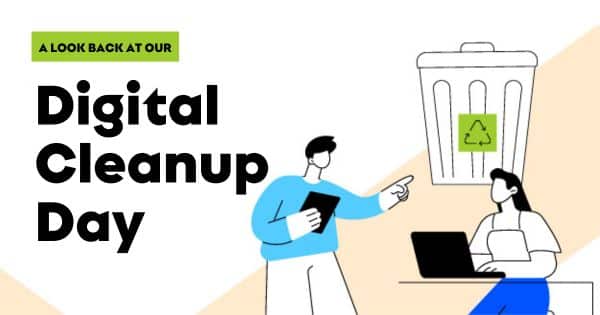On the occasion of Digital Cleanup Day 2025, Hardis Group France teams mobilized to reduce their digital footprint through concrete actions. This commitment, far from being a one-time effort, illustrates a broader approach embedded in the company’s CSR strategy, which combines digital sobriety, client support, and internal awareness.

A team effort… from Nantes to Grenoble!
On Wednesday, March 12, 2025, Hardis Group held its first edition of Digital Cleanup Day, an international event raising awareness about digital pollution.
From Nantes to Grenoble, via Lille, Bordeaux, Paris, and Lyon, everyone got involved! On this day, 1,815 gigabytes of data were deleted by our teams:
- 330 GB freed from our Cloud
- 1,485 GB deleted from work PCs
But what’s the actual impact of this action? By calculating the greenhouse gas emissions avoided by deleting the 330 GB from the Cloud, we get 69 kg of CO₂eq saved per year. To give a sense of scale, that’s equivalent to:
- 2,492 km traveled by regional train
- 1.41 days of skiing
- Producing 109 liters of coffee
- Or 97.7 kg of potatoes
As for the data deleted from PCs, it helps extend the lifespan of the equipment—a key lever to limit the production of new hardware, which is highly resource-intensive and CO₂-emitting.
Concrete Actions in Daily Practice
Beyond this collective effort, Hardis Group is actively working to sustainably reduce the environmental and social impact of its digital activities. This starts with responsible equipment management. The lifespan of IT hardware has been extended to 4 years, with a goal of reaching 5 years. PCs are refurbished internally and offered by default during equipment renewals. Finally, end-of-life recycling is handled by our partner AfB, a social enterprise specializing in IT equipment refurbishment.
This logic of digital sobriety also applies to data management. By raising team awareness about optimizing storage spaces, the company is tackling a lever that is often invisible but energy-intensive.
Structuring and Sharing a Responsible Approach
Hardis Group’s commitment doesn’t stop at its own offices. The company offers tailored support to organizations seeking to structure their responsible digital transition: audits, indicator definition, strategic consulting, training everything is designed to embed these efforts in the long term.
To promote the adoption of best practices, Hardis Group has also developed a smart assistant, the Responsible Digital GPT, designed to guide IT projects toward more sustainable choices.
This expertise was showcased at the Green Tech Forum in November 2024 in Paris. During a panel discussion on managing responsible digital practices, Hardis Group shared the key steps in its own approach and emphasized the importance of structured governance, appropriate frameworks, and concrete KPIs to measure impact.
These digital initiatives are part of a broader commitment, driven by the company’s CSR policy, built around three pillars: diversity and inclusion, reducing environmental impact, and access to education.
Similar Insights
-
Responsible Digital Technology: Five Key Topics for 2026
Responsible digital technology is entering a new phase: that of measurement and scaling up. At […]
November 25, 2025
-
Rexel commits to digital accessibility with an RGAA compliance audit
-
Web Ecodesign: Version 5 of the Standard Offers New Guidelines to Combine Efficiency and Quality
For more than ten years, the “web eco-design” framework has supported digital professionals seeking to […]
August 8, 2025